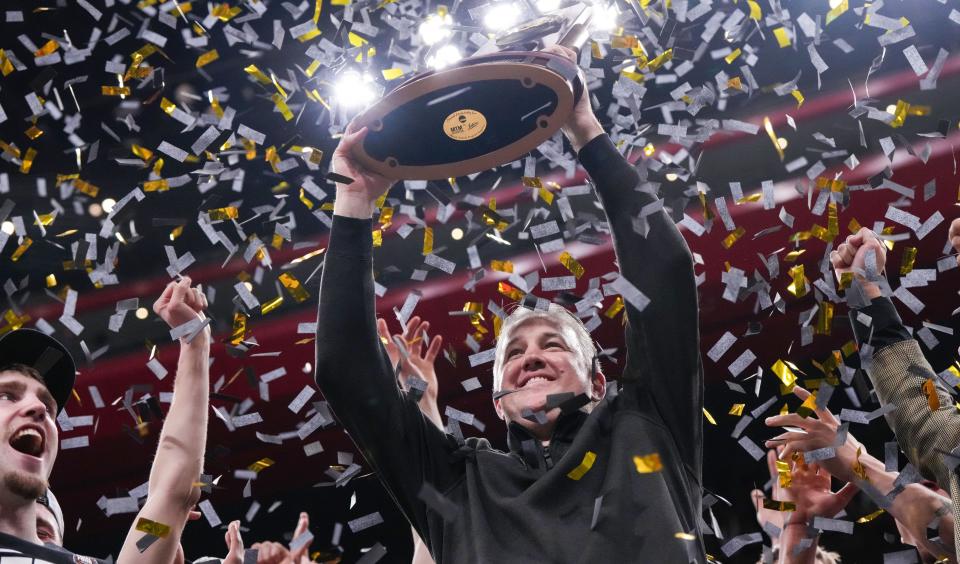WEST LAFAYETTE – Purdue Basketball spent most of the last decade oblivious to the treachery of the NCAA tournament bubble.
The programs nine consecutive NCAA appearances ranks a distant third behind Michigan State (25) and Gonzaga (24) as the longest streaks in the country. The Boilermakers have been a 5 seed or higher in the last eight tournaments.
(A pause for the important warning that the COVID-19 pandemic, which canceled the 2020 tournament and kept that streak alive. What happened to Purdue in the next four tournaments, however, only reinforced the achievement of building a resume and defending it in every corner of the bracket.)
Insider: Purdue Non-Conference Challenges Bring Potentially Huge Reward
Cutting sports is not Purdue’s first option: …but it takes creativity and efficiency to pay athletes

So if the NCAA Tournament expansion moves forward — and especially if it adds another full round of teams and approaches triple-digit entrants — it won’t have Purdue’s support.
Coach Matt Painter, who works for National Basketball Coaches Association Board of Directors, believes the expansion would involve just four to eight teams. Not that he sees the need to do that.
“My gut reaction is: Don’t mess with something that was very special,” Painter said.
Athletic director Mike Bobinski once judged the bubble resume as chairman of the NCAA tournament selection committee. He knows it’s a thankless, stressful job that, by its nature, destroys the hopes of teams who have struggled all season to face a subjective fate.
However, Bobinski is “not a fan” of expansion. He knows, in practice, that the wishes of media rights holders may end up winning out. More games equal more inventory, more advertising revenue for rights holders, and more money back to conferences and sports programs.
Therefore, it is prepared for “minimal” expansion – a few teams.
“These 96, 120 – under no circumstances,” Bobinski said. “To me, this is ridiculous. You can’t turn this event into a watered-down tournament for everyone.
“There’s a magic to why it’s so watched and so anticipated and people miss work the first few days. There’s something about that that’s really powerful. I think you run the risk of solving a problem that doesn’t exist right now.”
Last March, ESPN’s Pete Thamel reported that conversations had continued for expansion to a maximum of 80 teams. SEC Commissioner Greg Sankey co-chaired the NCAA transformation committee that recommended expansion a year earlier. He stirred debate and emotion when he told Thamel that giving tournament spots to automatic qualifiers instead of powerful conference teams was hurting the tournament’s competitiveness.
Those comments have aged poorly thanks to the SEC’s abrupt first round: 6-seed South Carolina losing to 11-seed Oregon, 4-seed Auburn losing to 13-seed Yale and 2-seed Kentucky losing to 15-seed Oakland.
Even without these examples of instant karma, Bobinski — a former athletic director at Xavier and Georgia Tech — isn’t sympathetic to the plight of brand-name teams, hoping their bubble doesn’t burst.
“Having been in that room six times with the committee, I remember each of those six years, when you pick the last at-large teams, you look at teams whose accomplishments during the year are suspect,” Bobinski said. “Their CVs already have too many gaps and too many question marks.
“That last group, five or six of them, you look at them like, ‘Eh, did they really do enough to earn a spot in this tournament? If you expand this further you will see more teams that look like this. And there will still be the next team that says, ‘What about us?’”
Painter feels sympathy for mid- and low-major teams that win their league in the regular season but lose in the conference tournament. He believes fielding the regular season champion will make the tournament stronger. He stopped short of arguing that both should participate – something that would almost certainly not find support among power conferences.
“To bring more people there – as long as it doesn’t disrupt the beauty and structure of the thing,” Painter said. “Obviously we had some really tough losses, but this is the NCAA tournament. That’s part of it. You have to play better. You have to be able to do this.
“That’s the magic of it.”
Both Painter and Bobinski used that word: “Magic.” They experienced this through overwhelming disruption and a long-sought-after Final Four.
Which begs the question: If a program that has been beaten in the NCAA Tournament as much as Purdue doesn’t want to change anything, why would anyone?
Follow IndyStar Purdue Insider Nathan Baird on the X at @nwbaird.
This article originally appeared in the Indianapolis Star: Purdue basketball leaders wary of NCAA tournament expansion




































